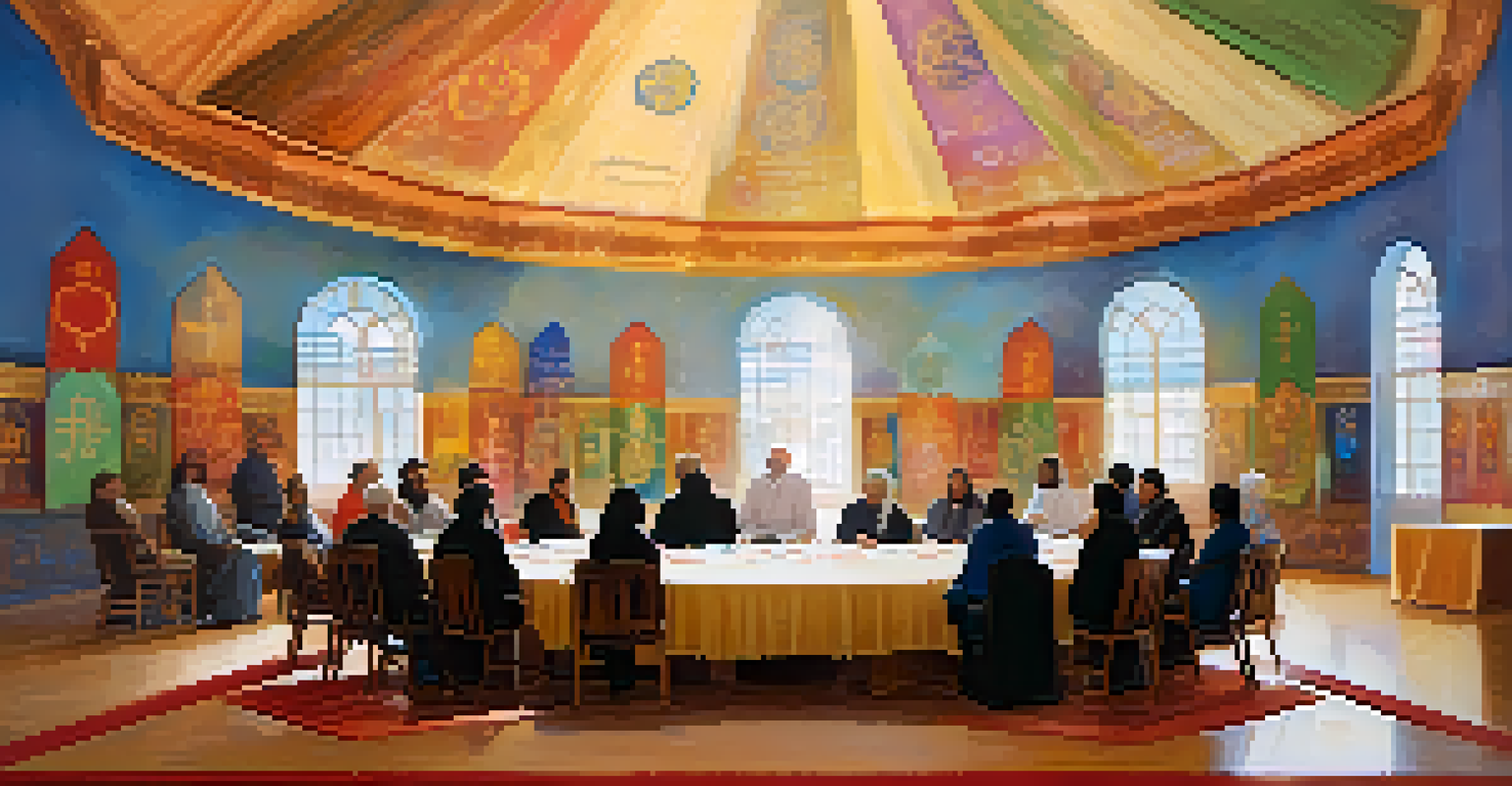Spirituality's Role in International Conflict Resolution Efforts

Understanding Spirituality in Conflict Resolution Contexts
Spirituality often offers a unique lens through which conflicts can be viewed and approached. Unlike traditional methods that rely heavily on political or economic factors, spirituality emphasizes inner peace, mutual understanding, and connection. This perspective encourages individuals and groups to look beyond their immediate grievances and consider the shared humanity that binds them together.
Spirituality is about finding the connection between our own lives and the lives of others.
By acknowledging spiritual dimensions, negotiators can foster an environment of empathy, compassion, and reconciliation. For instance, people engaged in a conflict might find common ground in shared values or beliefs, which can serve as a foundation for dialogue. This spiritual approach can help transform adversarial relationships into collaborative ones, paving the way for lasting peace.
Moreover, integrating spirituality into conflict resolution efforts can help address the emotional and psychological aspects of disputes. When individuals feel heard and understood on a deeper level, they are more likely to engage constructively, reducing hostility and promoting healing.
Historical Examples of Spirituality in Conflict Resolution
Throughout history, there are numerous examples where spirituality has played a central role in resolving conflicts. One notable instance is the work of Mahatma Gandhi during India's struggle for independence. Gandhi's philosophy of nonviolence, rooted in Hindu principles, inspired millions to seek peace rather than revenge, effectively uniting diverse groups in a common cause.

Similarly, the Truth and Reconciliation Commission in South Africa utilized spiritual principles to heal a nation divided by apartheid. By encouraging forgiveness and understanding, this initiative allowed victims and perpetrators to confront their past and work towards a more unified future. Such examples illustrate how spirituality can provide a powerful framework for addressing deep-rooted issues.
Spirituality Enhances Conflict Resolution
Integrating spirituality fosters empathy and understanding, transforming adversarial relationships into collaborative efforts.
These historical cases highlight that spirituality, while often overlooked, can be a significant catalyst for change. They serve as reminders that the path to resolution is not only about political agreements but also about healing the human spirit.
The Role of Faith Leaders in Peacebuilding Efforts
Faith leaders often serve as crucial mediators in conflict resolution processes, leveraging their influence to foster dialogue. They can bridge divides that political leaders might struggle to cross, thanks to their spiritual authority and community connections. For instance, interfaith dialogues led by religious figures can create safe spaces for discussions that might otherwise be too contentious.
Forgiveness says you are given another chance to make a new beginning.
In many cultures, religious leaders are viewed as guardians of moral values, making their involvement in peacebuilding efforts particularly impactful. Their teachings can promote principles such as forgiveness, compassion, and justice, which are essential for resolving conflicts. This spiritual guidance can help create a shared vision for peace that resonates with diverse groups.
Moreover, the presence of faith leaders in peace negotiations can lend credibility to the process, encouraging wider community participation. Their ability to inspire hope and mobilize grassroots support can significantly enhance the likelihood of successful outcomes.
Meditation and Mindfulness as Tools for Conflict Resolution
Meditation and mindfulness practices are becoming increasingly recognized as valuable tools in conflict resolution. These techniques help individuals cultivate inner calm, clarity, and emotional regulation, which can be incredibly beneficial during heated discussions. When participants approach negotiations with a centered mindset, they are more likely to engage constructively.
Practices such as guided meditation can foster empathy by encouraging individuals to consider others' perspectives more deeply. For example, participants in conflict resolution workshops often report feeling more connected and compassionate towards each other after engaging in mindfulness exercises. This shift in mindset can lead to more productive dialogues and collaborative solutions.
Faith Leaders as Peace Mediators
Faith leaders play a crucial role in bridging divides and promoting dialogue through their spiritual authority and community influence.
Incorporating these practices into conflict resolution efforts can help create a more peaceful atmosphere. As individuals learn to manage their emotions and reactions, they can contribute to a more respectful and understanding negotiation process.
Cultural Spirituality and Its Influence on Conflict Dynamics
Different cultures have their own spiritual beliefs that shape their approaches to conflict. Understanding these cultural nuances is essential for effective conflict resolution. For instance, indigenous cultures often emphasize communal values and the interconnectedness of all beings, which can influence their conflict resolution strategies.
By acknowledging and respecting these cultural spiritualities, mediators can create more inclusive processes that resonate with all parties involved. This cultural sensitivity fosters trust and encourages open communication, which are vital for successful negotiations. For example, integrating traditional rituals or practices into discussions can help honor diverse perspectives.
Recognizing the role of spirituality in various cultures can also help identify potential points of conflict. When these spiritual beliefs are overlooked, it can lead to misunderstandings or escalated tensions. Therefore, a culturally informed approach can facilitate smoother and more respectful resolutions.
Challenges in Integrating Spirituality into Conflict Resolution
While the integration of spirituality in conflict resolution holds promise, it does present certain challenges. One significant hurdle is the potential for differing interpretations of spiritual beliefs among conflicting parties. What one group sees as a guiding principle might be perceived differently by another, complicating negotiations.
Additionally, some individuals may be hesitant to embrace spirituality due to personal beliefs or past experiences. For those who prioritize secular approaches, introducing spiritual elements can seem foreign or irrelevant. Therefore, it's crucial for mediators to approach the topic of spirituality with care and sensitivity.
Cultural Sensitivity in Spiritual Approaches
Understanding and respecting cultural spiritualities is essential for creating inclusive conflict resolution processes that resonate with all parties.
Finding a balance between spiritual practices and practical negotiation strategies is essential. Mediators must ensure that discussions remain focused on resolving conflicts while respecting the spiritual dimensions that may arise. This requires skillful navigation to create an inclusive environment where everyone feels comfortable.
The Future of Spirituality in Global Conflict Resolution
As the world grapples with increasingly complex conflicts, the role of spirituality in resolution efforts is likely to grow. More organizations and peacebuilders are recognizing the importance of addressing the emotional and spiritual dimensions of conflict. This trend suggests a shift toward more holistic approaches that encompass not only political and economic factors but also the human spirit.
Emerging technologies and social media platforms provide new avenues for spiritual leaders and peace advocates to connect with broader audiences. Online forums and virtual gatherings can help facilitate discussions that transcend geographical boundaries, promoting a global dialogue around spirituality and conflict resolution. This connectivity can strengthen collective efforts to foster peace.

Ultimately, as more people seek deeper meaning and connection in their lives, spirituality will likely continue to play a vital role in shaping our approaches to conflict resolution. By embracing these spiritual dimensions, we can work towards creating a more compassionate and understanding world.